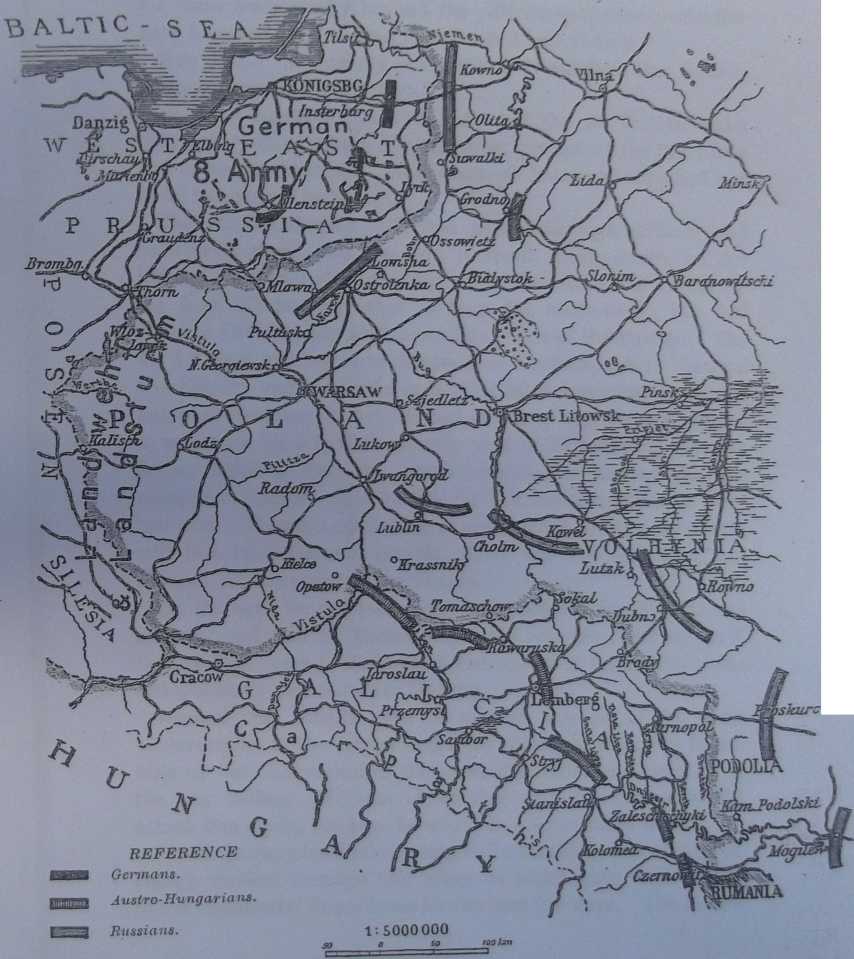DSCF5543
My War Memories, 1914-1918
most of his success at Gumbinnen and advance ąuickly, my plan would be unthinkable. Then thcre would be no altemative but to withdraw the ist R.C. and the lyth A.C. in a morę Southwest erly direction towards Wormditt, while the other part of the 8th Army held up the Narew Army and prepared to check it, if occasion served. The idea of a stiff defence of some linę east of the Vistula, if necessaiy, also entered into our calcu-lations.
We discovered by degrees that Rennenkampf was advancing only slowly. The two Army Corps could therefore be gradually deflected in their retirement through the Bartenstein-Gerdauen linę, in a sharp southerly direction to Bischofsburg-Neidenburg.
Next, the lyth A.C., protected by the ist Cavalry Division and the ist R.C., was moved south via Schippenbeil to Bischof-stein. As soon as it had passed behind the ist R.C., and on the 2Óth advanced from Bisckofstein to Bischofsburg, the ist Army Corps" itself moved, south of Schippenbeil, in the direction of Seeburg. Only the ist Cav. Division remained facing Rennenkampf, near, and to the south of, Schippenbeil. Of this division, also on the 2Óth, the ist Cavalry Brigade received the order to draw out via Rossel on Sensburg. Accordingly, from the 27th of August onwards, only two cavalry brigades stood between Lakę Mauer and the riyer Pregel, facing twenty-four very strong infantry and several cavalry divisions of Rennenkampf s. The defensive chain of lakes was thus open on the west; and in any case it would have been quite easy to turn it and completely isolate Kónigsberg.
Our decision to give battle arose out of the slowness of the Russian command and was justified by the necessity of winning in spite of inferiority in numbers. It was nonę the less one of tremendous grayity.
On this linę the two Corps were marching in the rear of the Narew Army from Neidenburg to Allenstein. In this way they exposed their rear without adeąuate protection to Rennenkampf's army, which was only two or three days' march away. When the battle began in real eamest on the 27th and, in contrast to previous wars, was not finished in one day but continued until
APPENDK TO TANNENBERG
CONCENTRATION OF AUCUST 1914

t
Wyszukiwarka
Podobne podstrony:
DSCF5541 My War Memories, 1914-1918 For a long time my mobilization orders had appointed me Director
DSCF5552 My War Memories* 1914-1918 The supply columns and trains of the ist R.C. and the 27th A.C.,
DSCF5555 My War Memories, 1914-1918 meagre. Sonie of the officials had forsaken their posts. The wir
DSCF5557 My War Memories, 1914-1918 were the effect of the altered situation, and subseąuently prove
DSCF5542 My War Memories, 1914-1918 was indeed very serious, but, aft er all, the problem was not in
DSCF5547 My War Memories, 1914-1918 The zoth Anny Corps was to carry out the attack wblch had been f
DSCF5551 My War Memories, 1914-1918 break-thrcmgh, an encircling movement, firm resolution to win an
DSCF5553 My War Memories, 1914-1918 had to wait and see wlietlier our main attack would succeed or f
DSCF5539 My War Memorles, 1914-1918 I came to Andenne, where I saw a gruesome tand distressing examp
DSCF5540 My War Memorles, 1914-1918 General von Stein, who was at that time Q\artennast.er-Gcneral,
DSCF5545 My War Memorles, 1914-1918 Anny was advanc.ing, its left wing in doholon, its 6tli Corps di
DSCF5546 My War MemorJes; 1914-1918 Von der Goltz’s Landwehr Diyision, which had been placed at our
DSCF5554 My War Memorles, 1914-1918 by front al and fianking attacks. Whilst at Tannenberg we took o
CCI20140507�19 - ju- the same time most of the moisture in the skin evaporates, hence the shrinkage.
DSC00903 (6) 111 is known, that fractures of bones both at youths and elder men happen in the area o
ł / 1 t 2nd iHioiest, l&U Dear General Auchinleck, Tho shortneen of ywur vic±t Ivsro and ty
DSCF5556 My War Mcmoriea, 1014-1918 Th© order to retreat from the Mani© wus Issucul, whntluir on goo
więcej podobnych podstron